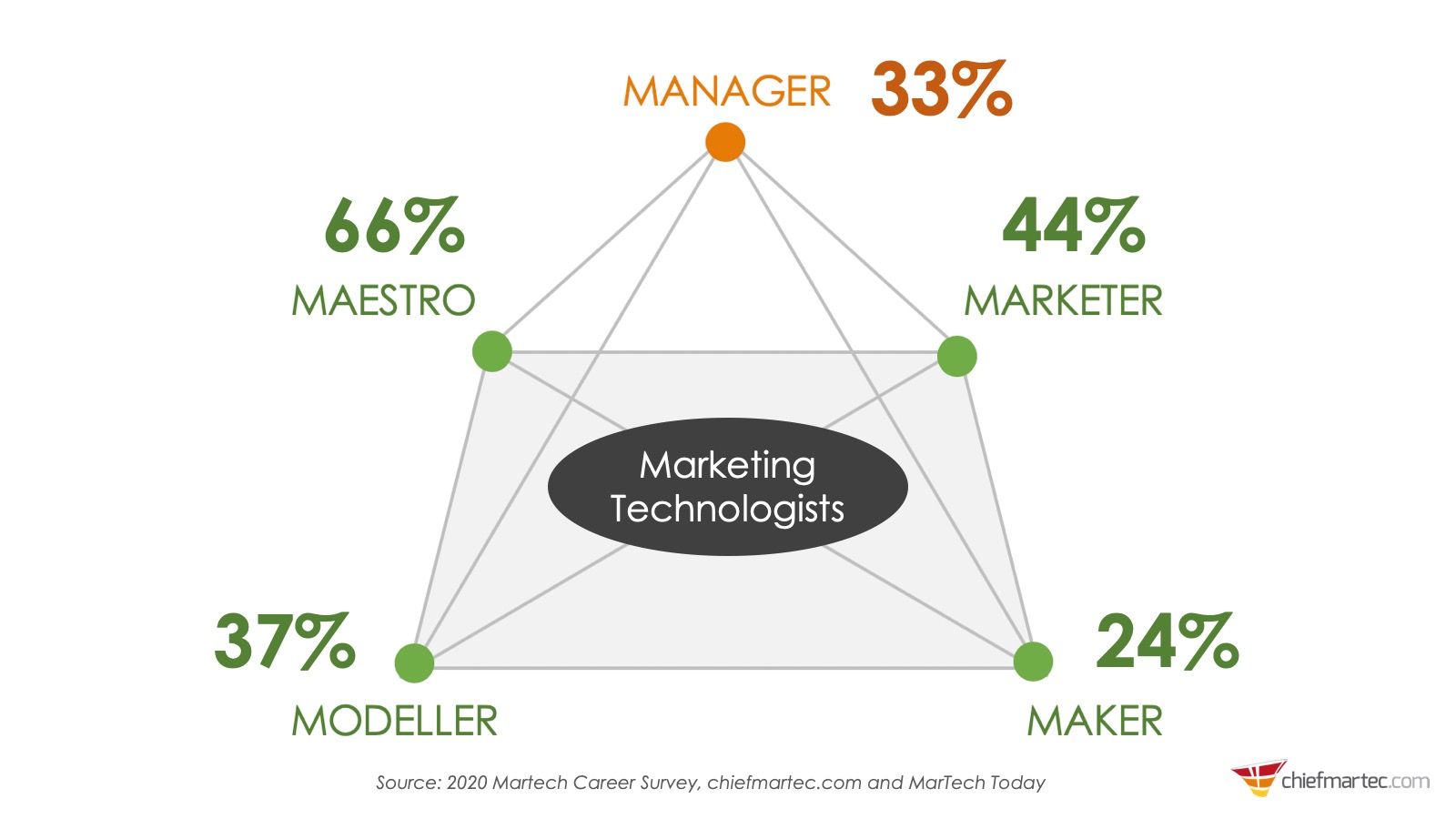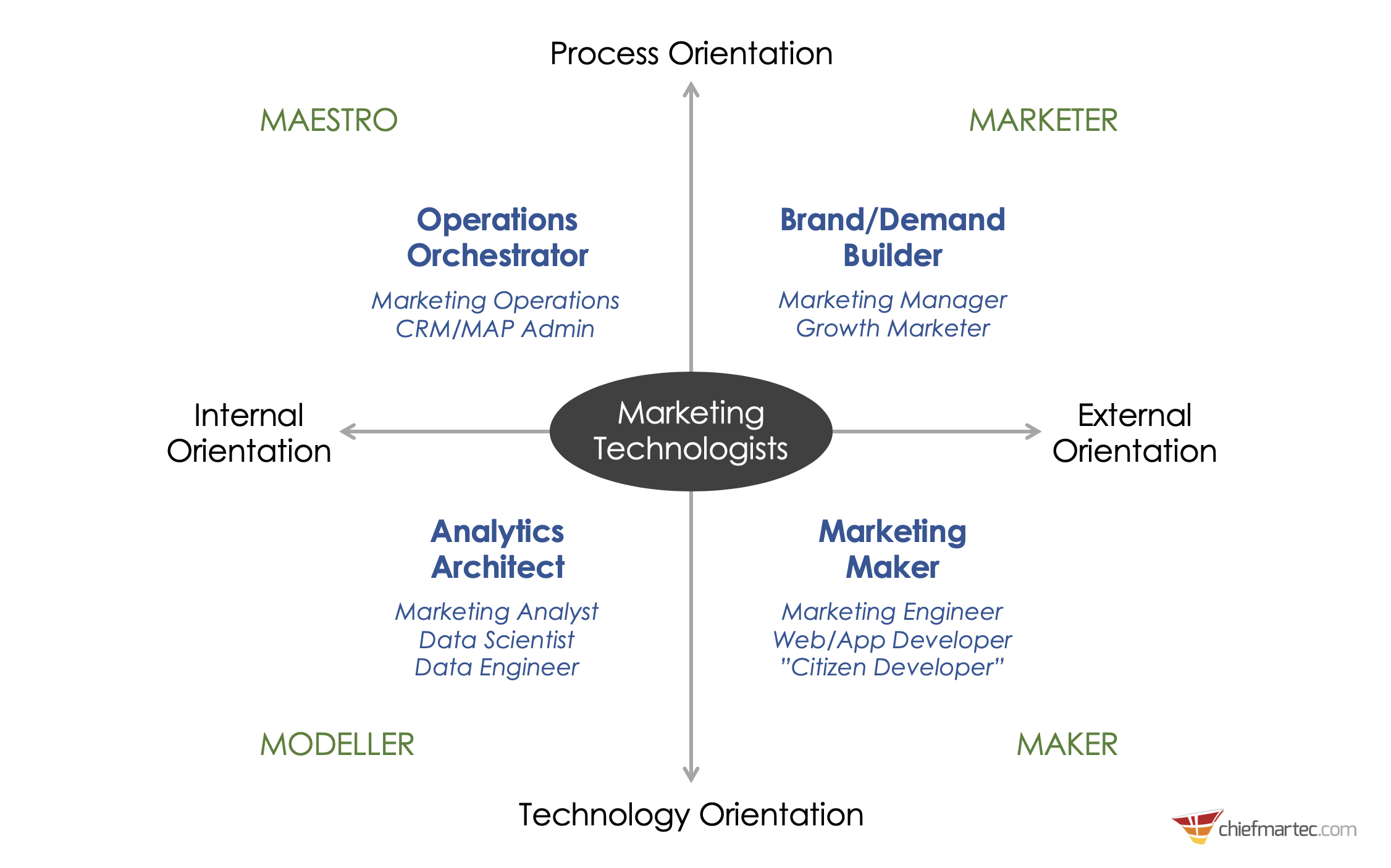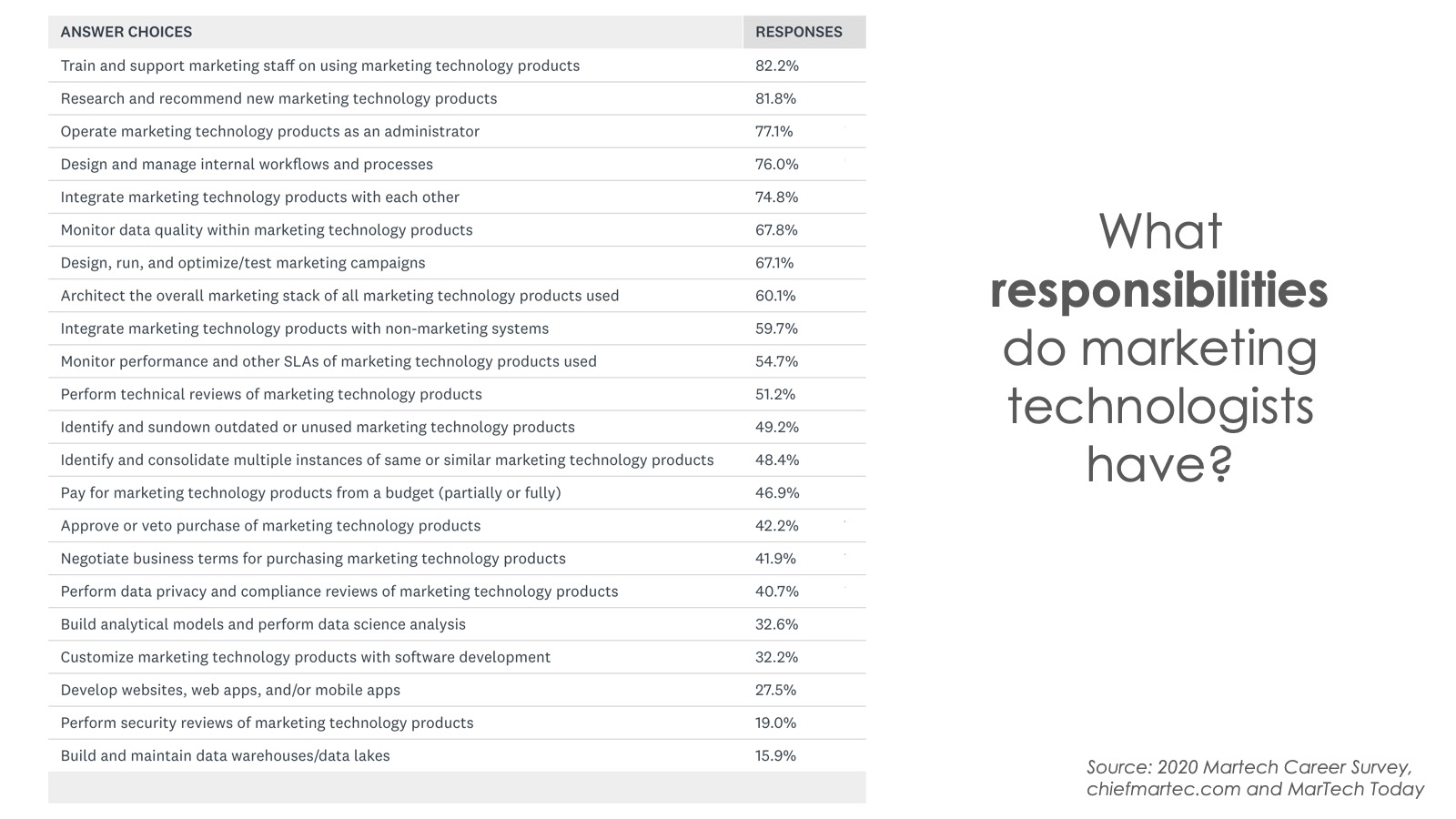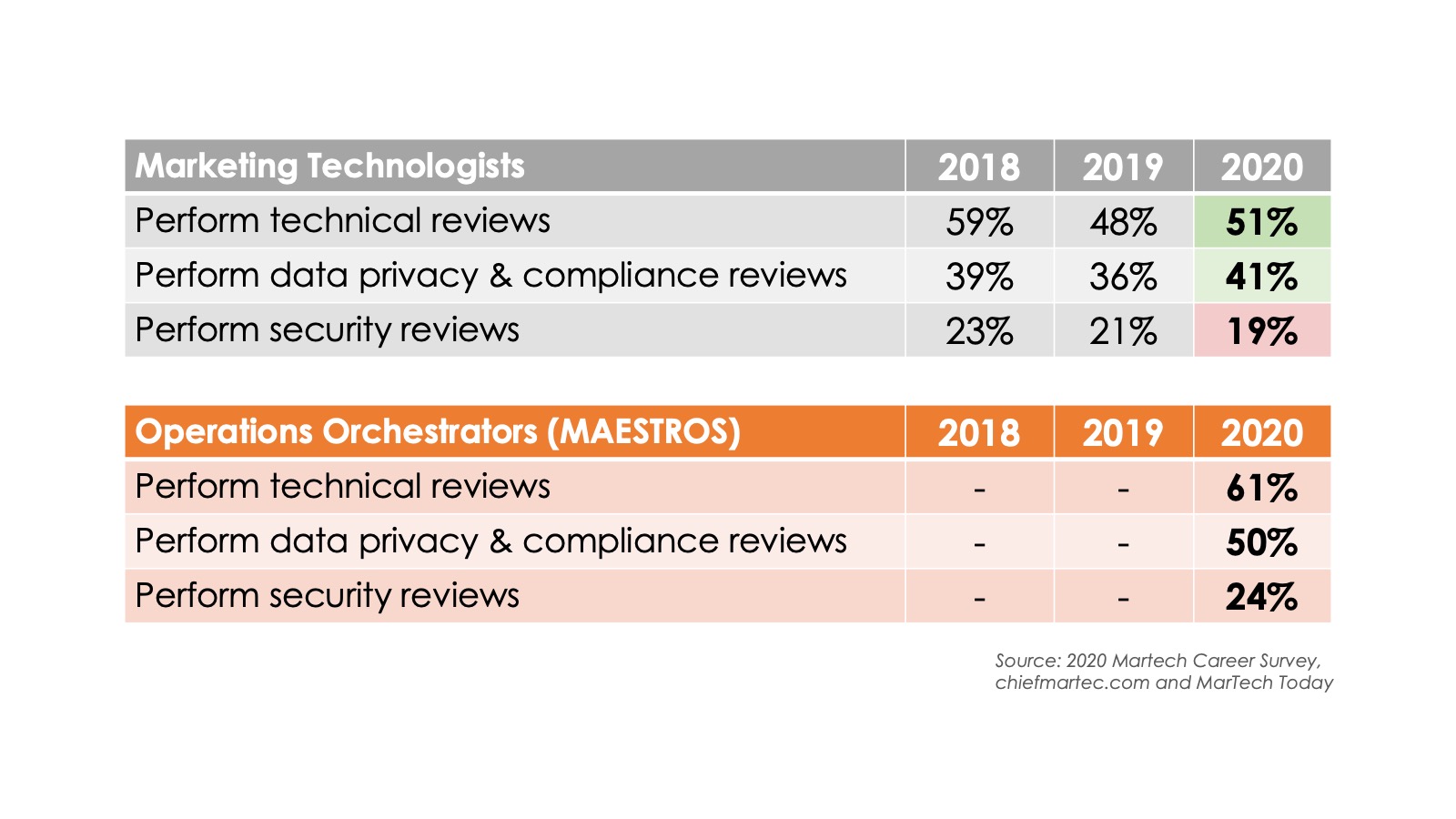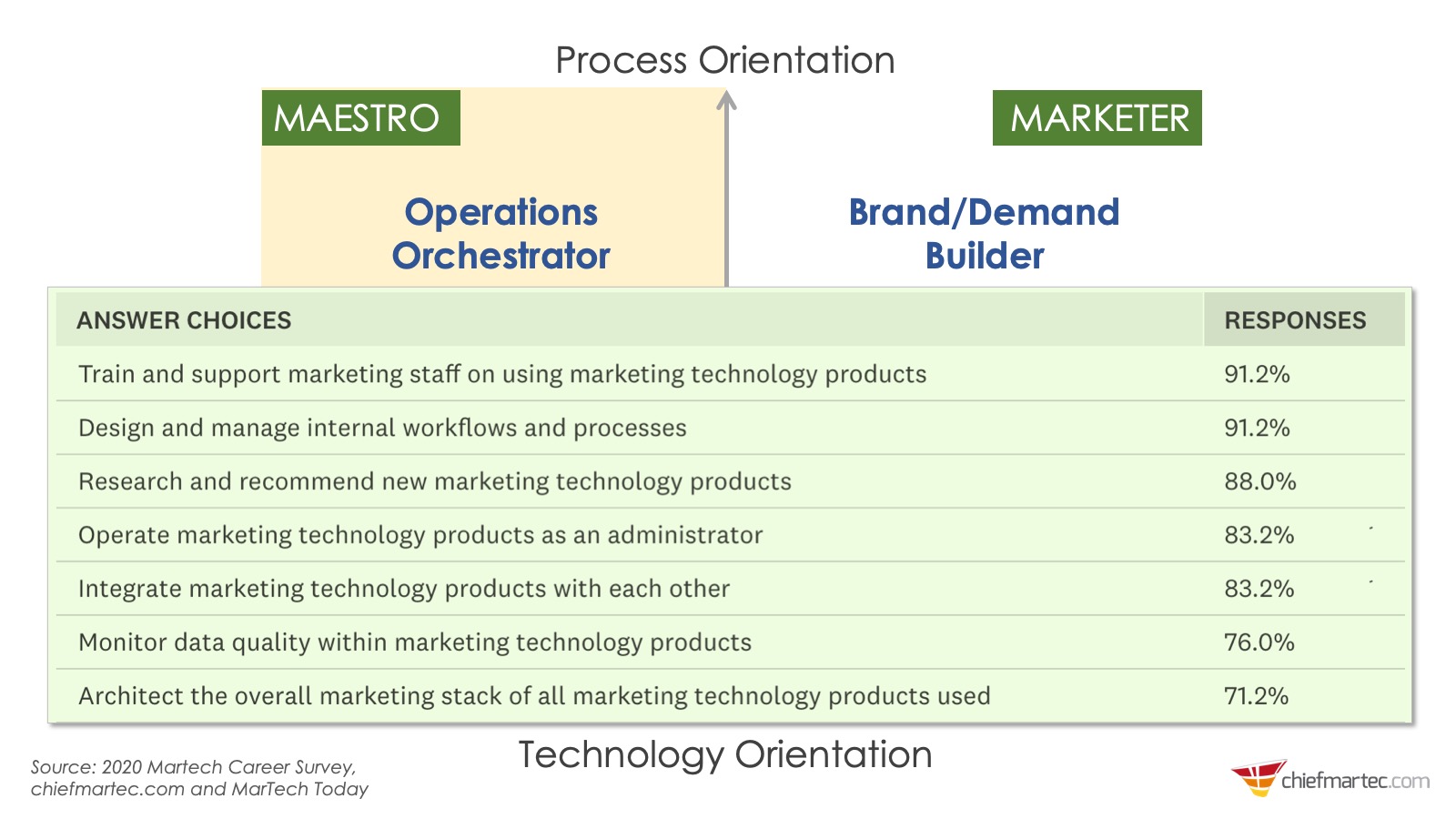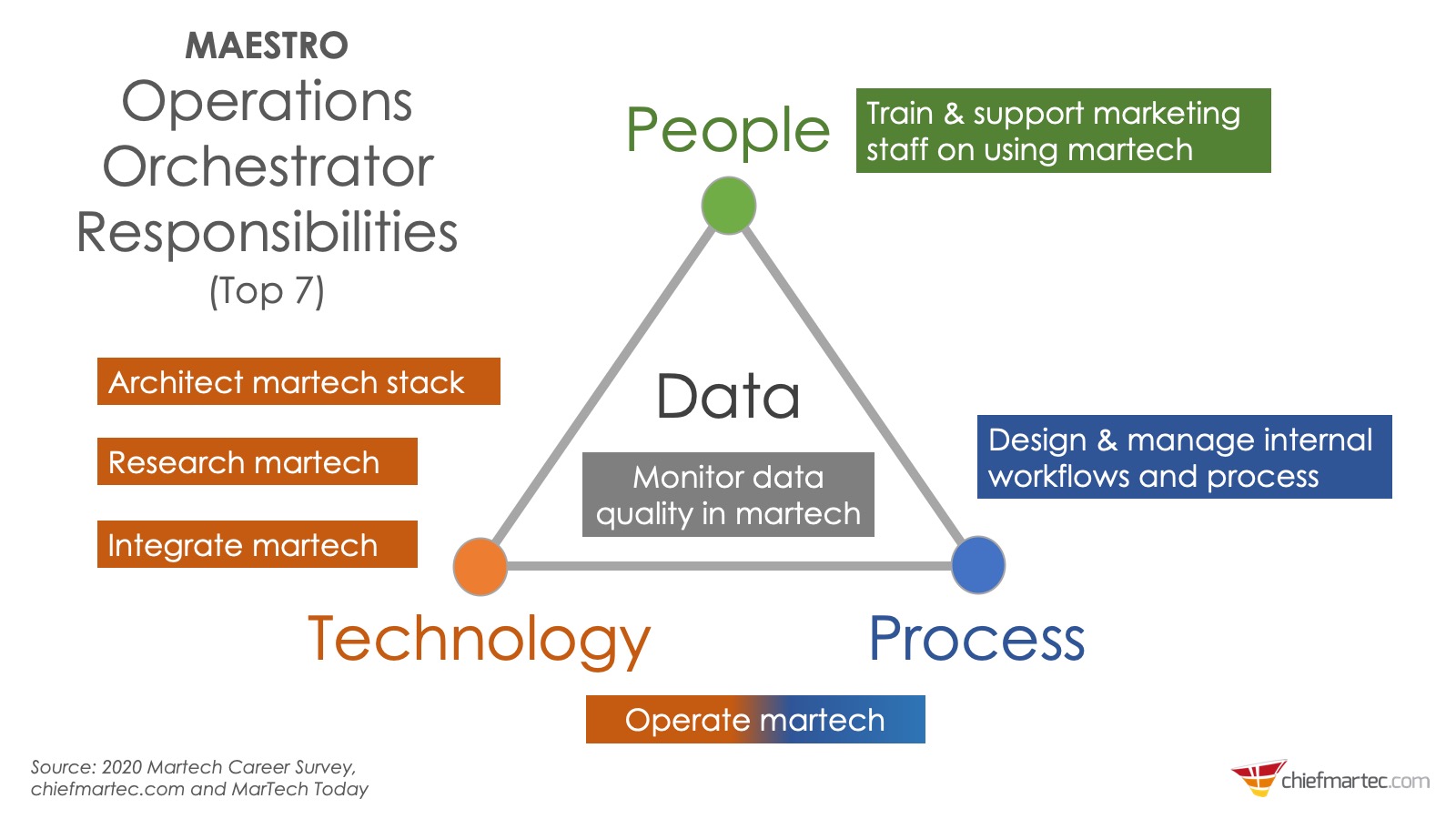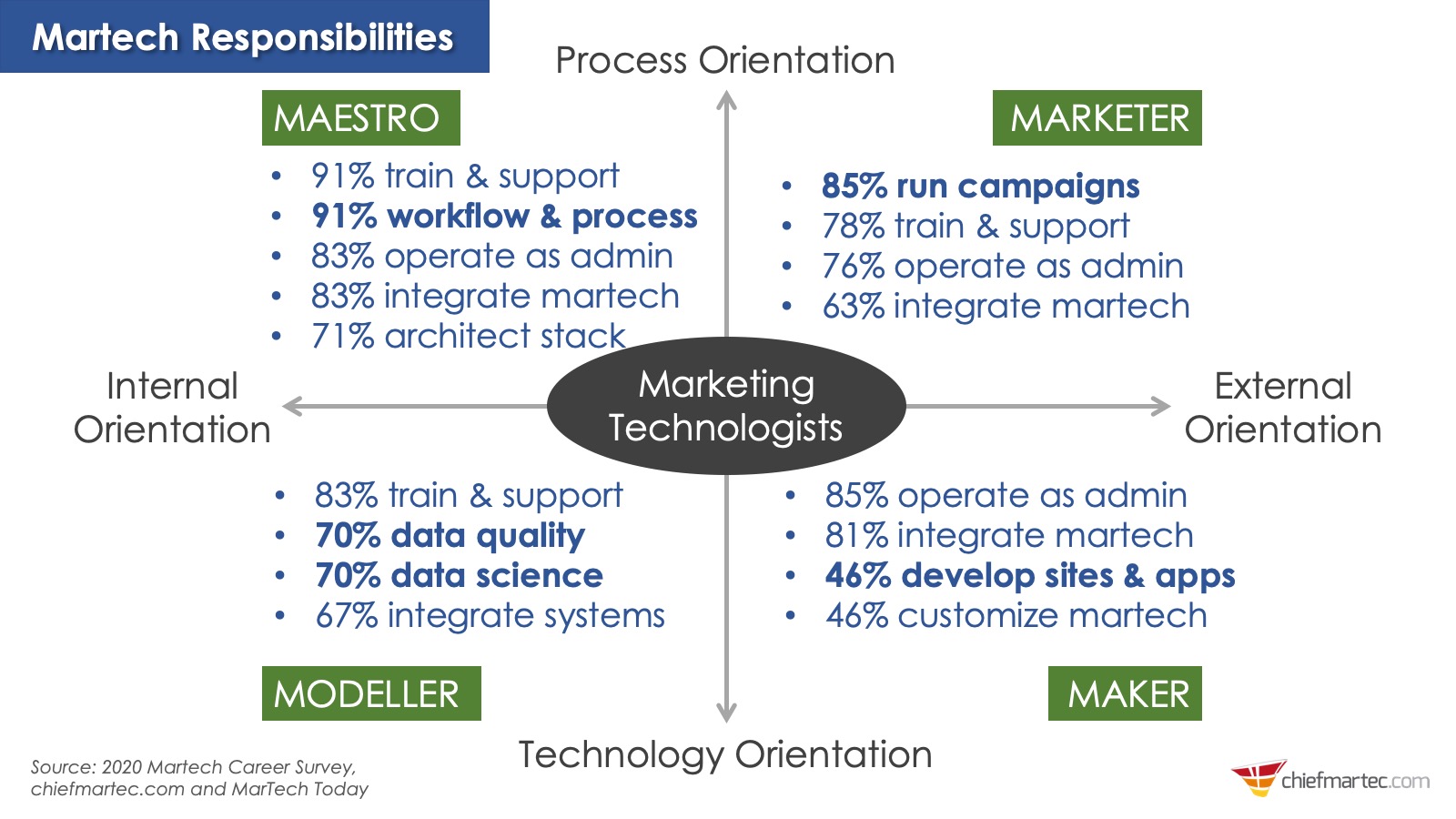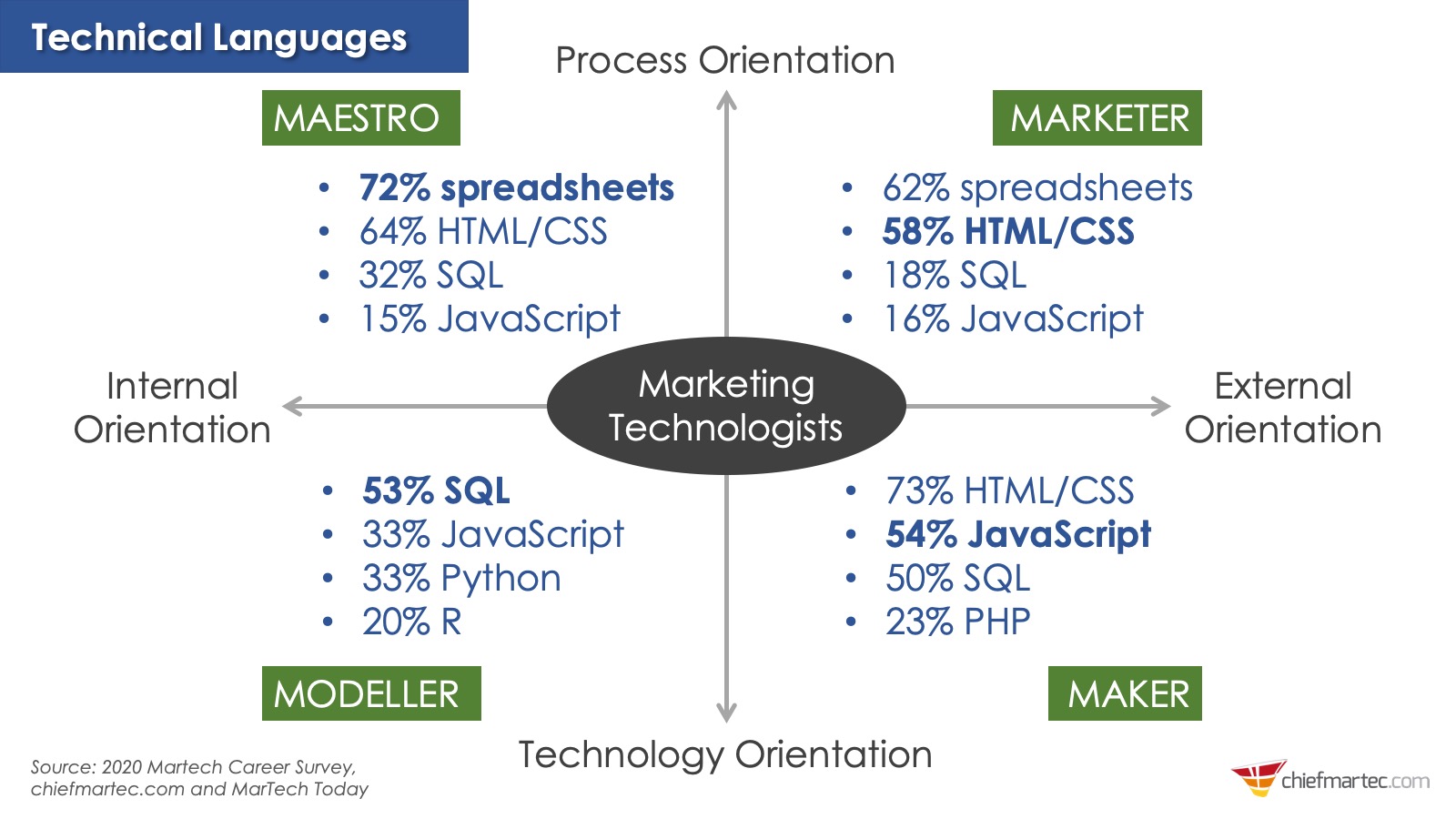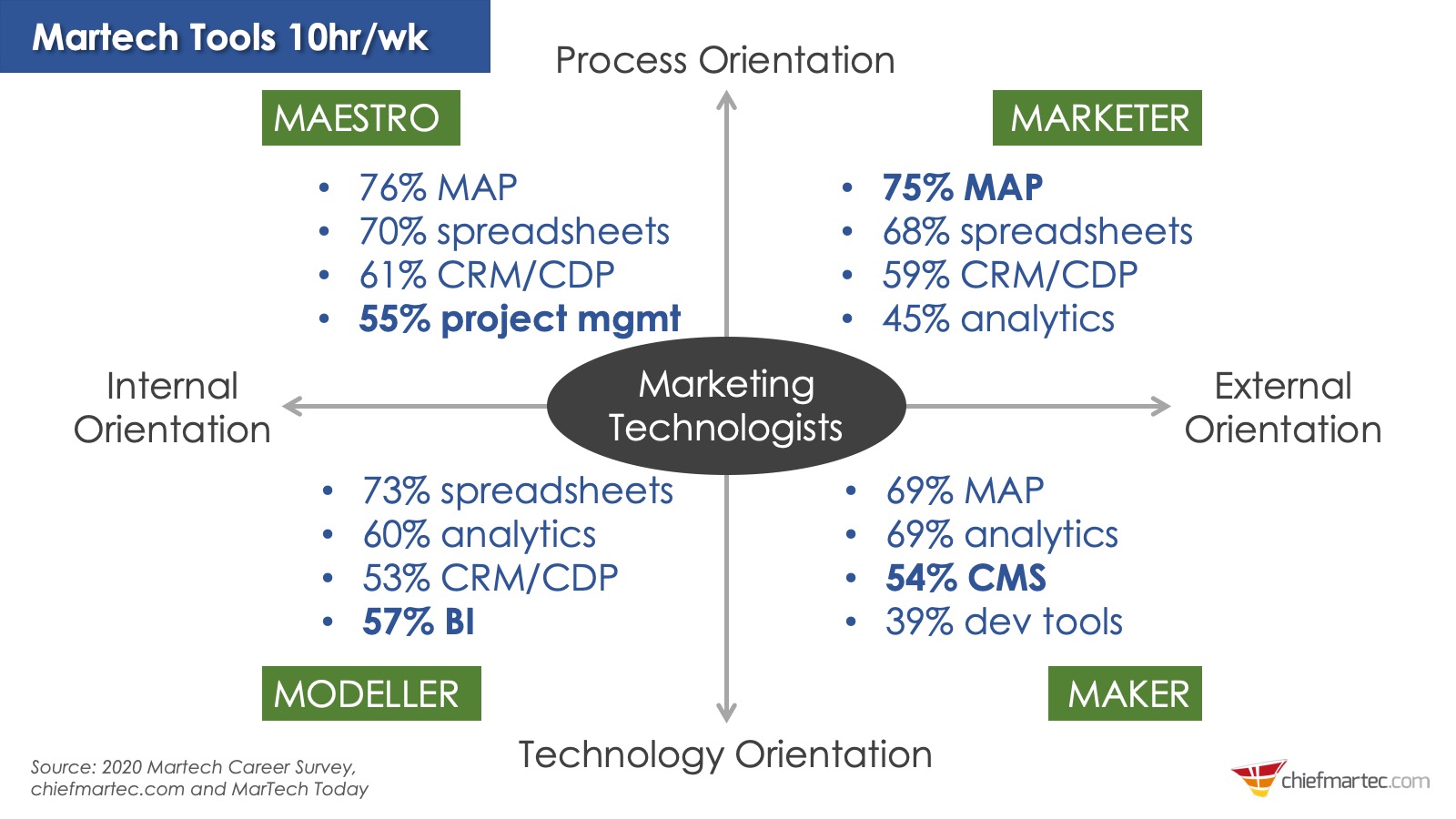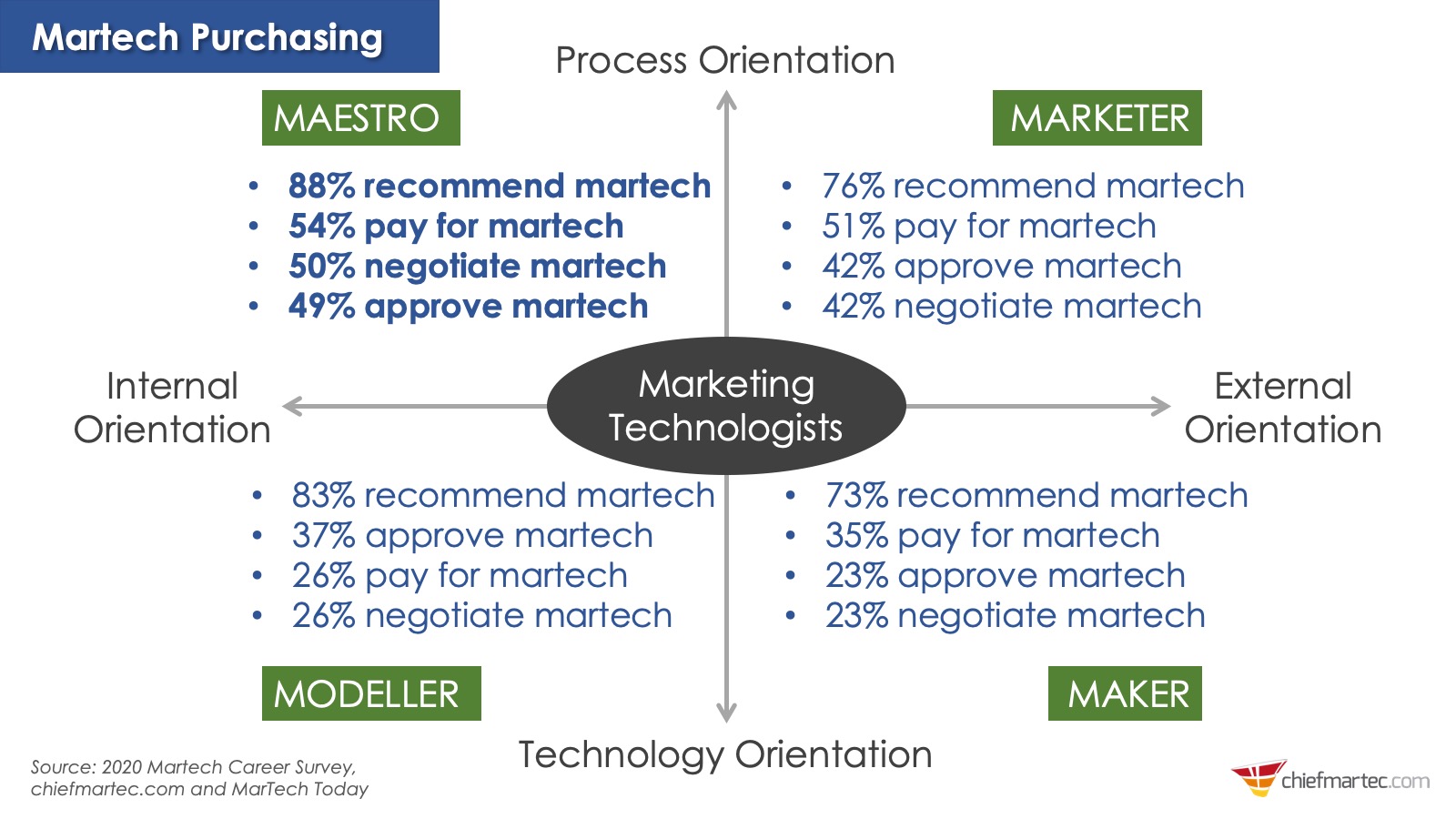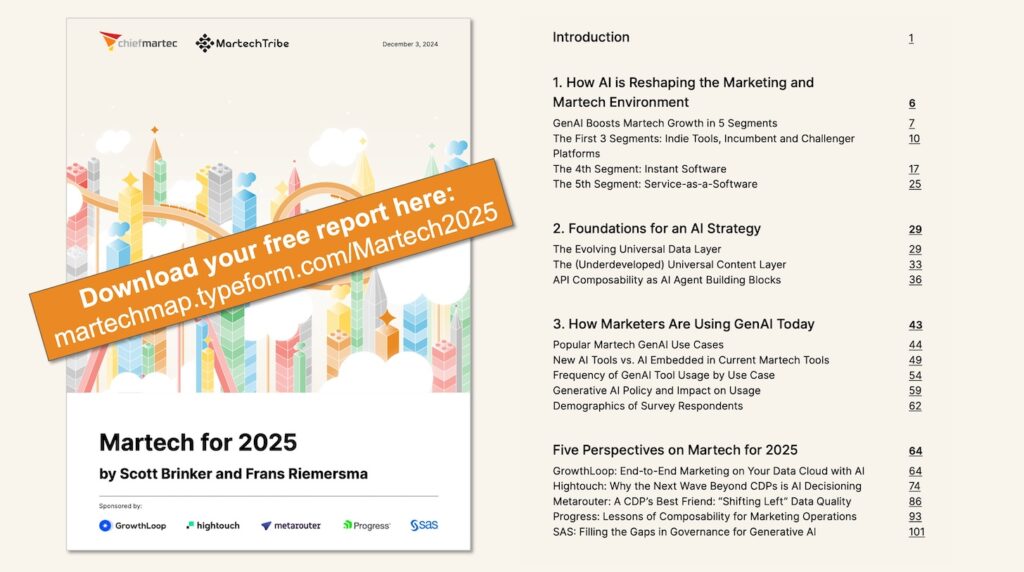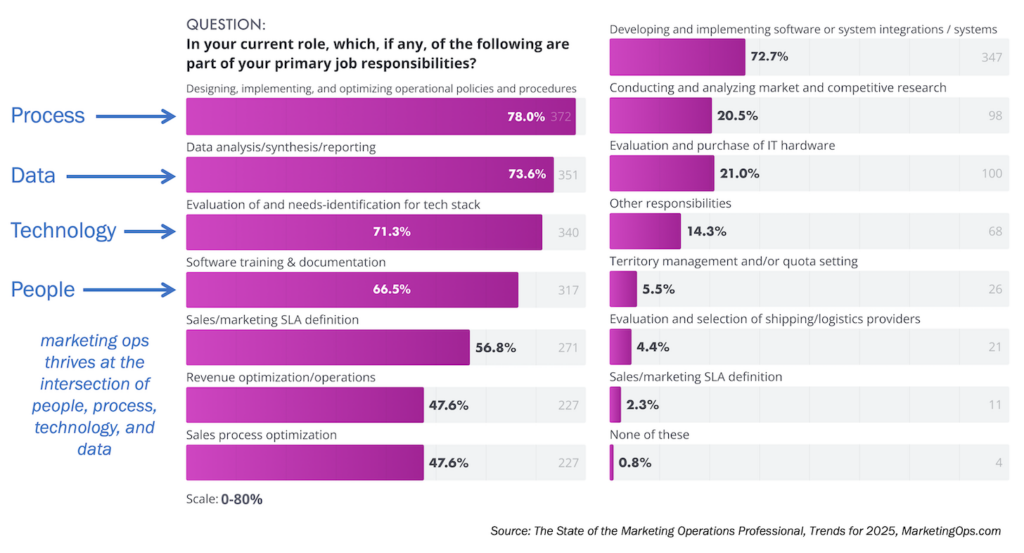At today’s virtual Discover MarTech event, I’ll be digging into the latest data from our 2020 Martech Career Survey run in collaboration with the team at MarTech Today. We’ll have an official report out later, but we wanted to get some of these key findings to you right away.
In this year’s study, I added a couple of questions about the 4 kinds of marketing technologist roles that I had mapped out earlier this year, so we could segment the results:
- Brand/Demand Builder (MARKETER) — a tech-savvy marketer who uses martech
- Operations Orchestrator (MAESTRO) — a marketing technology and operations leader
- Analytics Architect (MODELLER) — a marketing data and analytics specialist
- Marketing Maker (MAKER) — a marketing developer who builds sites and apps
Operations and analytics roles tend to be more internally oriented, serving stakeholders within the marketing organization. The marketer and “maker” roles are more externally oriented, more directly serving customers and prospects. Marketers and operations leaders are more process oriented, while analytics experts and makers are a little more technology oriented.
The pyramid at the top of this post shows the percentage of each who participated in this year’s survey. The totals add up to more than 100% because some participants indicated that they served multiple roles in their jobs. The “manager” role, as you probably guessed, oversees other marketing technologists. (All the vertices of the pyramid are connected to make the point that in a good marketing organization these roles are entwined, not siloed.)
However, for segmentation purposes, we also asked participants to pick which role — out of the four quadrants in the 2×2 — that they most identified with. This revealed the interesting differences between these roles in responsibilities, skills, tools, purchasing, and more.
Overall Marketing Technologist Job Responsibilities
Let’s start with the list of job responsibilities for all marketing technologists who responded in this year’s survey (click to read a larger version):
You can compare that with the data from the 2018 and 2019 martech career surveys, and you’ll see that the percentages of marketing technologists for each are relatively consistent. (We added a few additional responsibilities in this year’s survey, but kept all the ones from previous years for the benefit of seeing longitudinal trends.)
One distressing trend is that the number of marketing technologists who have responsibility for performing security reviews continues to drop — down to a new low of 19% this year. The eternal optimist in me would like to believe this is because they defer that responsibility to an independent IT security team. But the dogged realist in me thinks this is still a failure of the martech profession overall.
Security should be everyone’s responsibility in martech leadership.
A more encouraging trend is seeing more marketing technologists take responsibility for data privacy and compliance reviews — up to a three-year high of 41%. (It still should be higher.)
Now, if we break out the data of participants who identified as Operations Orchestrators, things look a little better: 50% take responsibility for data privacy and compliance reviews and 61% perform technical reviews of martech software. At least 1 in 4 also do security reviews.
We still have a ways to go on security and privacy, but we’re headed in the right direction.
Marketing Operations Job Responsibilities
But let’s dig into the job responsibilities of the “maestro” Operations Orchestrators — the folks who are often leading marketing operations and marketing technology as an official role:
For the seven job responsibilities shown above, all were reported by more than 70% of these Operations Orchestrators as a part of their role. One of the things that makes me smile is that the top two job responsibilities have more to do with people and process than technology:
- 91.2% train and support marketing staff on using marketing technology products
- 91.2% design and manage internal workflows and processes
If we lay out these top seven job responsibilities along the classic people-process-technology triangle, we see that these marketing operations roles span all three:
Different Job Responsibilities Between Martech Roles
Let’s now look at the segmentation of responsibilities across all four quadrants of martech roles:
The above graphic just shows the highlights — we’ll cover the full breakdown in our follow-up report — but it gives you a sense of what makes each of these roles unique:
- Marketers run campaigns (85%)
- Operation managers run workflow and process (91%)
- Analytics experts do data science (70%)
- Makers/developers build sites and apps (46%)
Skills are another dimension along which these roles differ. We asked which technical languages that respondents were fluent with, and you can see the divergence:
I consider “spreadsheets” a technical language, when you’re mastering formulas and scripts. Expert spreadsheet design is akin to software development. It’s no surprise that spreadsheet interfaces have been embraced by no-code tools to make every marketer an app developer.
These are the languages that tend to make roles within certain quadrants unique:
- Operations managers are wizards with spreadsheets (72%)
- Analytics experts know SQL (53%) — and are the only ones who know R (20%)
- Makers/developers know HTML/CSS (73%) and JavaScript (54%)
What’s impressive is that 53% of marketers also know HTML/CSS too. Although, to be fair, we’re talking about tech-savvy marketers — marketing technologists — not the general population of all marketers. (At least not yet.)
There’s also a significant difference in the tools that these different roles spend 10 or more hours per week using:
To highlight a few of the differences:
- Operations managers work in project management tools (55%)
- Analytics experts work in business intelligence (BI) tools (57%)
- Makers/developers work in content management systems (54%)
It’s worth pointing out that tech-savvy marketers spend a lot of time working in their marketing automation platforms (MAP) and CRM/CDP tools — 75% and 59% respectively.
Another remarkable finding is that all roles spend a lot of time in analytics tools. Not just the analytics experts, who arguably use a more advanced analytical toolset. If you were looking for evidence that marketing technologists are generally a data-driven group of professionals, this makes for a compelling narrative. To a certain degree, you are the tools you use.
Speaking of martech tools, here’s one more cut of data that is fascinating — how these roles differ in responsibility for recommending, approving, negotiating, and paying for marketing technology:
Not surprisingly, Operations Orchestrators are the ones most likely to recommend martech tools (88%), approve their purchase (49%), negotiate with martech vendors (50%), and pay for martech products out of their budget (54%).
What is more surprising — at least at first glance — is just how much every role on this 2×2 quadrant contributes to the recommendation of martech tools. Makers 73%. Analysts 83%. And marketers 76%.
But with a little reflection, this isn’t that surprising. Again, all of these roles are variations of marketing technologists. And the growth in adoption of SaaS products has continued to grow year-over-year. The average enterprise now uses 1,295 cloud services. So, of course, each of these martech specialists will have their own subset of tools specific to their craft.
Now, you might be wondering how the current pandemic crisis will impact martech tool adoption moving forward. I’ll cover that very topic tomorrow when unveiling the new 2020 marketing technology landscape…
